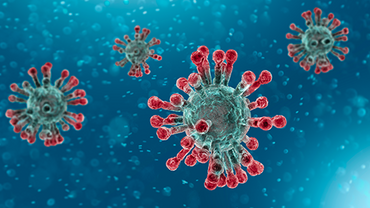ECDC publishes epidemiological update on increased COVID-19 transmission, SARS-CoV-2 variants, and public health considerations for autumn 2023
Today, the European Centre for Disease Prevention and Control (ECDC) is providing an update on the current status of COVID-19 transmission in the European Union and European Economic Area (EU/EEA), the emergence of new SARS-CoV-2 variants, and public health considerations for Autumn 2023.
In recent weeks, there has been a noticeable increase in signals of SARS-CoV-2 transmission in the EU/EEA, deviating from previously very low levels. Several factors have contributed to this increase, including large gatherings and increased travel. Additionally, there have been reports of waning levels of immunological protection against infection, although severe disease remains well protected against in the general population.
SARS-CoV-2 continues to acquire mutations that enable its circulation at unpredictable times throughout the year. Recent transmission increases have coincided with the emergence of Omicron sub-lineages, particularly the XBB.1.5-like variants.
In August 2023, sporadic detections of a new highly mutated Omicron sub-lineage, BA.2.86, were reported both within and outside the EU/EEA. While global case detections of BA.2.86 are limited, low-level community transmission is suspected in multiple countries. BA.2.86 is highly divergent from currently circulating SARS-CoV-2 strains, raising concerns of increased re-infections if it outcompetes existing variants in the EU/EEA.
ECDC Director Andrea Ammon said:
"Currently, there is no evidence to suggest that infection with one of the emerging variants is associated with more severe disease or a reduction in vaccine effectiveness when compared to other currently circulating variants. However, older individuals and those with underlying health conditions remain at an increased risk of severe disease if infected, so autumn vaccination programmes should prioritise protecting individuals at risk of severe disease, such as those aged over 60 years and other vulnerable groups."
As vaccination campaigns begin, countries should address factors that have previously hindered vaccine uptake. Effective communication campaigns involving healthcare professionals and the public are vital in emphasising the importance of COVID-19 vaccination for high-risk groups.
In the past year, the completeness of epidemiological and virological COVID-19 surveillance data in the EU/EEA has decreased significantly. The emergence of BA.2.86 highlights the importance of maintaining vigilance against SARS-CoV-2 by strengthening surveillance systems. ECDC urges countries to sequence and report all SARS-CoV-2-positive specimens from representative surveillance systems to facilitate the assessment of circulating variants.
ECDC continues to closely monitor the evolving COVID-19 situation and will provide further updates as necessary, and reminds everyone to adhere to public health guidelines, including vaccination, to safeguard both individuals and the community.





